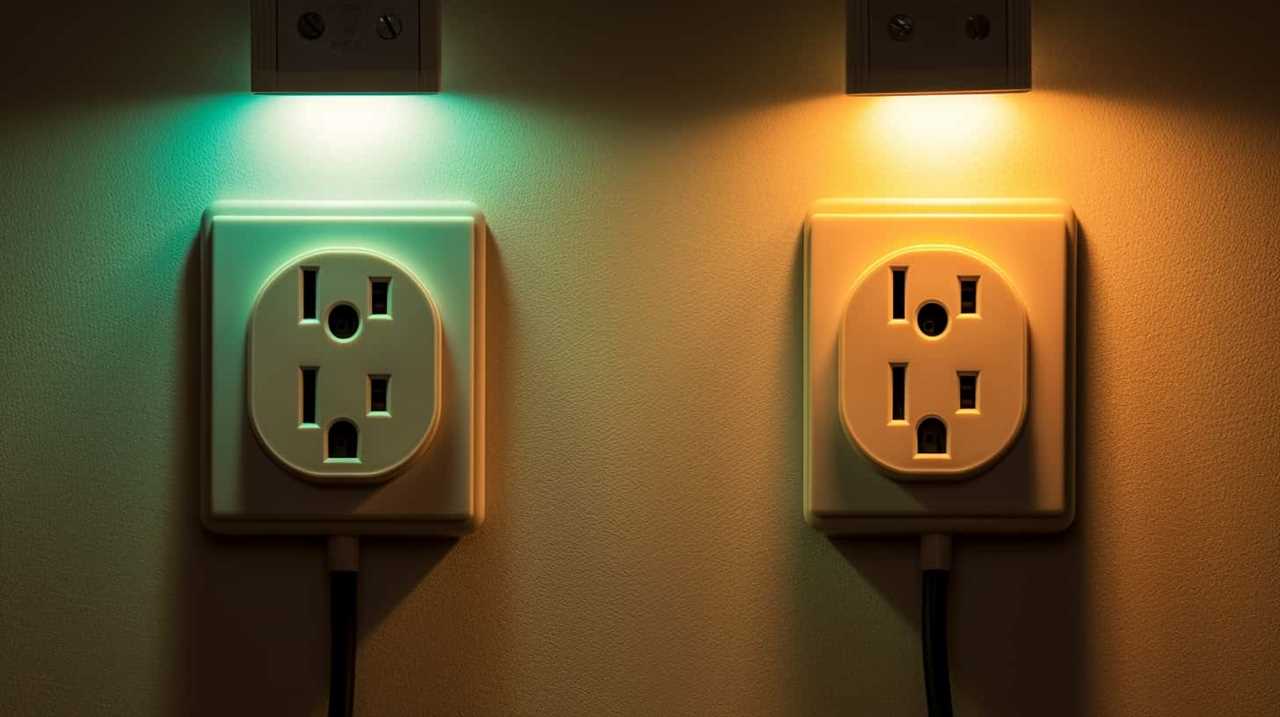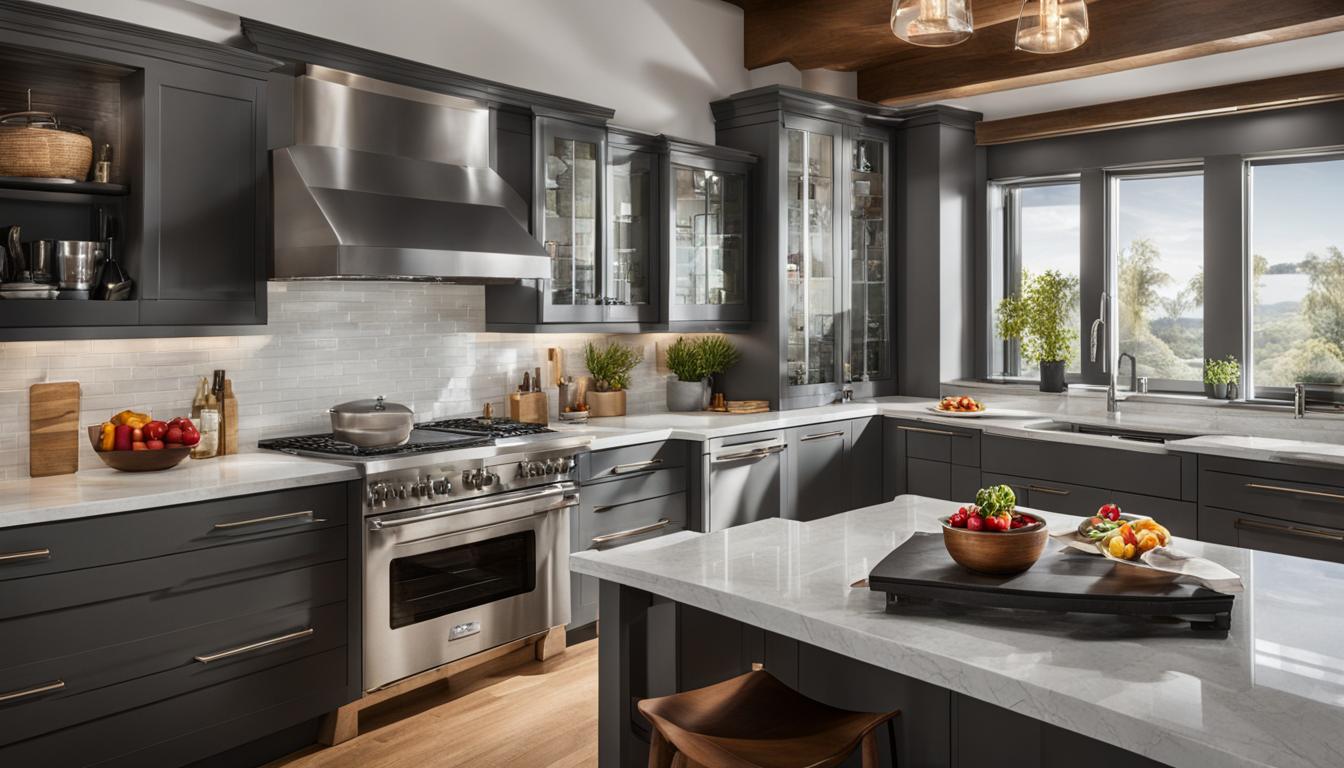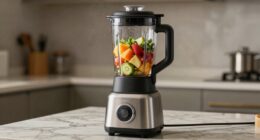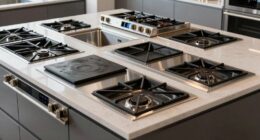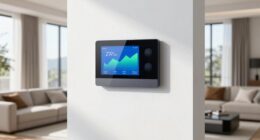At our house, we recently had a scary situation that reminded us of the significance of keeping our home appliances safe.
One evening, as we were using our microwave, it suddenly started emitting sparks and smoke. Thankfully, we were able to quickly unplug it and prevent a potential fire.
This incident prompted us to research and implement measures to ensure the safety of all our home appliances. In this guide, we will explore the various steps and precautions that can be taken to protect ourselves and our homes from appliance-related hazards.
By following these measures, we can ensure the safe and efficient operation of our appliances, giving us peace of mind and preventing any potential accidents.

Key Takeaways
- Regular maintenance and inspections are essential for ensuring the safety and longevity of home appliances.
- Proper installation and positioning of appliances is crucial to prevent accidents and maximize efficiency.
- Safe electrical connections and grounding techniques are necessary to reduce the risk of electrical shock or fire.
- Adequate ventilation and airflow are important for preventing overheating and maintaining appliance safety.
Regular Maintenance and Inspections
Regular maintenance and inspections help ensure the safety of our home appliances. By taking preventive measures and scheduling regular professional servicing, we can avoid potential hazards and extend the lifespan of our appliances.
When it comes to preventive measures, there are several tasks that homeowners can perform themselves. For example, regularly cleaning the filters of our air conditioning units and dryer vents can prevent overheating and potential fire hazards. Additionally, checking and replacing worn-out cords and plugs can prevent electrical accidents. It’s also important to keep appliances away from water sources to avoid any potential electrical shocks.
However, some maintenance tasks require the expertise of a professional. For instance, having our heating systems inspected and cleaned by a qualified technician can ensure their efficient and safe operation. Likewise, calling in a professional to service our gas appliances, such as stoves or water heaters, can help prevent gas leaks and potential carbon monoxide poisoning.
Regular maintenance and inspections not only ensure the safety of our home appliances but also help us save money in the long run. By addressing any issues promptly, we can prevent major breakdowns and costly repairs.

Proper Installation and Positioning
To ensure the safety of our home appliances, we must prioritize proper installation and positioning. This is crucial in preventing accidents and maximizing the efficiency of our appliances. Here are some installation tips and positioning guidelines to follow:
- Read the manufacturer’s instructions: Before installing any appliance, carefully read the instructions provided by the manufacturer. These instructions will guide you on the proper installation process specific to your appliance.
- Ensure stability: Make sure that the appliance is stable and secure. Use leveling tools to ensure that the appliance is balanced and not at risk of tipping over.
- Allow for proper ventilation: Many appliances, such as refrigerators and dryers, require adequate ventilation to function properly and prevent overheating. Ensure that there’s enough space around the appliance for air to circulate freely.
- Consider proximity to water sources: When installing appliances that use water, such as washing machines and dishwashers, ensure that they’re positioned near a water source and have appropriate drainage.
By following these installation tips and positioning guidelines, you can ensure the safety and optimal performance of your home appliances.
Remember to always prioritize safety and consult a professional if you’re unsure about any aspect of the installation process.
Safe Electrical Connections and Grounding
One important measure to ensure the safety of our home appliances is to establish proper electrical connections and grounding. Electrical safety is crucial in preventing accidents and protecting both our appliances and ourselves from harm.
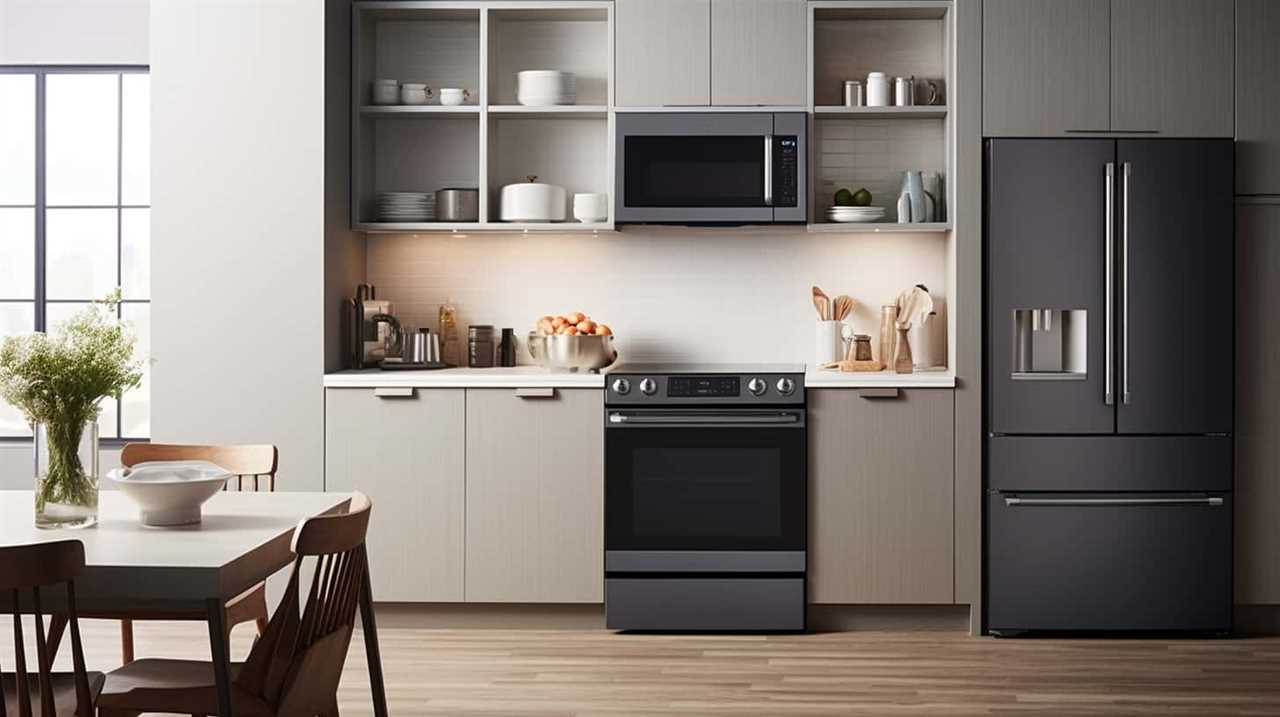
When it comes to electrical connections, it’s essential to use the right type and size of electrical wire for each appliance. This ensures that the wire can handle the electrical load without overheating or causing a short circuit. It’s also important to use appropriate connectors and terminals to secure the wires and prevent them from coming loose.
Additionally, grounding techniques play a vital role in electrical safety. Grounding provides a safe path for electrical currents to flow into the ground, preventing the build-up of excess electricity and reducing the risk of electrical shock or fire. To ensure proper grounding, it’s necessary to install grounding rods or plates and connect them to the electrical system. Regular inspections and maintenance of the grounding system are also essential to ensure its effectiveness.
Adequate Ventilation and Airflow
Ensuring proper ventilation and airflow is essential for maintaining the safety of our home appliances. Adequate ventilation requirements and effective airflow management are crucial factors to consider when it comes to appliance safety. Here are four key points to understand and implement:
- Ventilation requirements: Different appliances have specific ventilation needs to prevent overheating and ensure optimal performance. It’s essential to follow the manufacturer’s guidelines regarding the recommended clearance space around the appliance. This allows for proper air circulation and prevents the buildup of heat that could potentially lead to malfunctions or fires.
- Airflow management: Proper airflow within an appliance is vital for cooling critical components and preventing overheating. Regularly cleaning and replacing filters, such as those in air conditioners or refrigerators, is crucial to maintain efficient airflow. Additionally, ensuring that vents and ducts are unobstructed and free from dust or debris is equally important.
- Placement considerations: When positioning appliances, it’s important to avoid blocking vents or air intakes. Placing appliances too close to walls or other objects can restrict airflow, leading to overheating and potential safety hazards. Allow sufficient space for air to circulate around the appliance, especially for devices that generate heat, such as ovens or dryers.
- Regular maintenance: Regularly inspecting and maintaining appliances is essential for identifying and addressing any ventilation or airflow issues. This includes cleaning dust or debris from vents, ducts, or filters, as well as checking for any signs of wear or damage. Timely maintenance ensures that appliances continue to function safely and efficiently.
Using Appliances as Intended
We should always use our appliances in the intended manner to ensure their safety and longevity. Proper appliance usage is crucial for maintaining the efficiency and effectiveness of our home appliances. Following the manufacturer’s instructions and guidelines is essential to avoid any potential risks or damages.

To ensure proper appliance usage, it’s important to read the user manual thoroughly before operating any new appliance. This will provide valuable information on installation, operation, and maintenance. Regular appliance maintenance is also necessary to keep them running smoothly and safely. This includes cleaning filters, removing dust and debris, and checking for any signs of wear or damage.
In addition, it’s important to avoid overloading appliances and to use them for their intended purpose only. Overloading can put excessive strain on the appliance, leading to malfunctions or even accidents. Likewise, using appliances for purposes they weren’t designed for can be dangerous and result in damage.
Monitoring for Unusual Behavior or Malfunctions
To ensure the safety of our home appliances, it’s important that we regularly monitor them for any signs of unusual behavior or malfunctions. By doing so, we can catch potential issues early on and prevent them from escalating into serious problems.
Here are four important steps to help us effectively monitor our appliances:

- Automated Alerts: Many appliances nowadays come equipped with advanced technologies that can detect and alert us to any abnormal behavior. These alerts can be in the form of notifications on our smartphones or emails, providing real-time updates on the status of our appliances. By enabling these automated alerts, we can stay informed and take immediate action if any issues arise.
- Regular Inspections: It’s crucial to conduct regular inspections of our appliances to identify any visible signs of wear and tear or damage. This includes checking for loose wires, leaks, strange noises, or unusual odors. By being proactive in our maintenance, we can address potential malfunctions before they become major safety hazards.
- Monitoring Energy Consumption: An unexpected increase in energy consumption could be a sign of an underlying issue with our appliances. By keeping track of our energy bills and comparing them to previous months, we can spot any significant changes and investigate the cause. This can help us identify appliances that may be malfunctioning or operating inefficiently.
- Scheduled Maintenance: In addition to regular inspections, it’s important to follow the manufacturer’s recommended maintenance schedule for each appliance. This may include tasks such as cleaning filters, lubricating moving parts, or replacing worn-out components. By adhering to these schedules, we can prolong the lifespan of our appliances and reduce the risk of malfunctions.
Storing and Disposing of Appliances Safely
How can we safely store and dispose of our appliances?
When it comes to storing appliances, it’s important to take certain precautions to ensure their safety. First, make sure to clean the appliance thoroughly before storing it. This will help prevent the build-up of dirt and dust, which can potentially cause damage. Then, disconnect the appliance from the power source and carefully wrap the power cord to prevent any tangles or tripping hazards.
When it comes to disposing of appliances, it’s crucial to do so in a safe and responsible manner. One option is appliance recycling, which involves taking your old appliances to a recycling center where they can be properly dismantled and recycled. This not only helps to reduce waste but also ensures that any hazardous materials are disposed of correctly.
Another safe disposal option is to donate your appliances to organizations that accept used appliances and distribute them to those in need.

Familiarizing Yourself With Safety Regulations and Guidelines
As homeowners, it’s essential for us to familiarize ourselves with safety regulations and guidelines to ensure the proper use and maintenance of our home appliances. Understanding potential hazards and ensuring proper maintenance are crucial steps in keeping our homes safe. Here are four key points to help you navigate safety regulations and guidelines:
- Stay informed about product recalls: Regularly check the Consumer Product Safety Commission (CPSC) website for any recalls or safety alerts related to your appliances. This will keep you updated on potential hazards and help you take necessary precautions.
- Read the user manual: Familiarize yourself with the user manual provided by the manufacturer. It contains important information about installation, maintenance, and safety precautions specific to your appliance. Following these guidelines will minimize the risk of accidents or damage.
- Seek professional assistance: If you’re unsure about handling any repairs or maintenance tasks, it’s best to seek professional help. Trained technicians have the expertise to handle appliances safely and can ensure proper maintenance, reducing the risk of accidents.
- Regularly inspect and clean appliances: Regular inspections and cleaning are essential for maintaining the safety and efficiency of your appliances. Check for loose or damaged parts, frayed cords, or any signs of wear and tear. Keep them clean and free of dust or debris to prevent potential hazards.
Frequently Asked Questions
What Are the Potential Risks of Not Performing Regular Maintenance and Inspections on Home Appliances?
Not performing regular maintenance and inspections on home appliances can lead to potential dangers and risks.
It’s important to understand the importance of regular maintenance to ensure the safety of your appliances.
Neglecting maintenance could result in electrical malfunctions, overheating, or even fires.

By performing regular inspections, you can identify any issues early on and prevent them from escalating into more serious problems.
Taking these measures will greatly reduce the risks associated with home appliances and keep your home safe.
How Can Improper Installation and Positioning of Home Appliances Affect Safety?
Improper installation and positioning of home appliances can have serious safety implications. A simple oversight in placing an appliance too close to flammable materials or in an unstable position can lead to fires, accidents, or even electrocution.
Additionally, neglecting regular maintenance and inspections further exacerbates these risks. It’s essential to ensure appliances are installed correctly and positioned safely, minimizing the potential hazards they may pose.
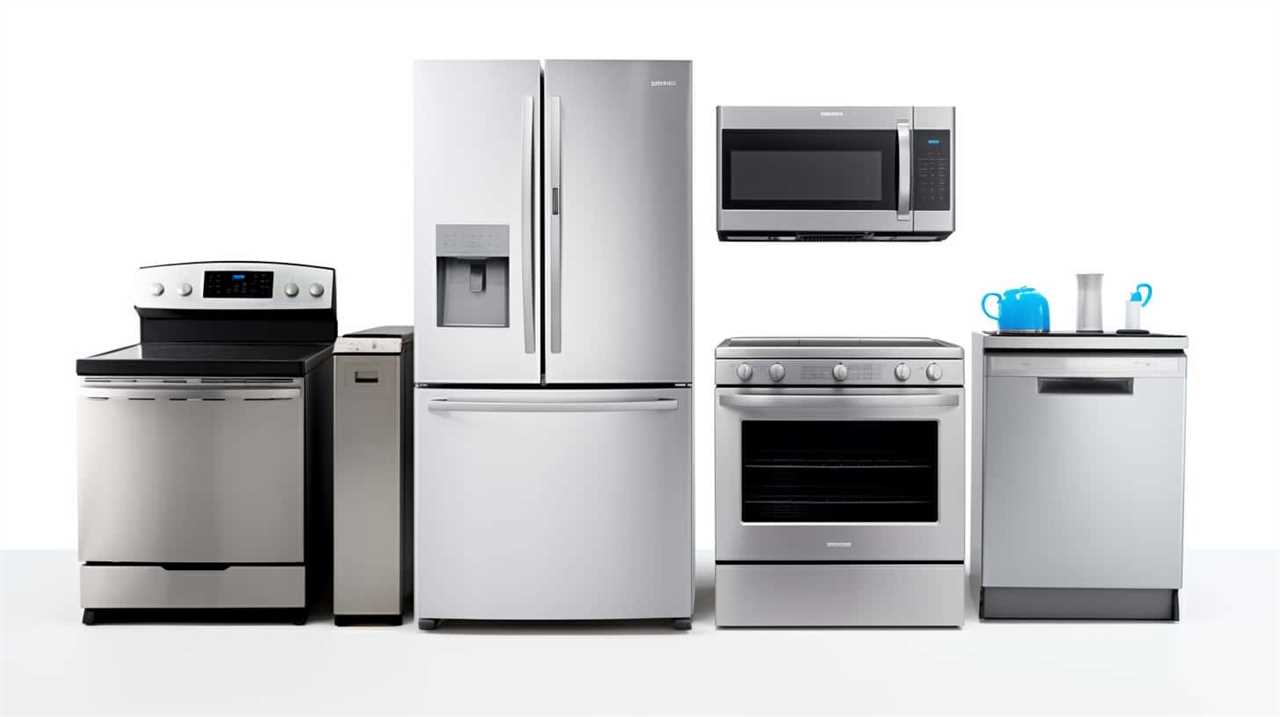
Regular maintenance and inspections are crucial to identify any issues and address them promptly, guaranteeing the safety of your home and loved ones.
What Are the Consequences of Unsafe Electrical Connections and Grounding in Home Appliances?
Unsafe electrical connections and improper grounding in home appliances can have serious consequences.
One major consequence is the increased risk of electrical fires. When appliances aren’t properly grounded, excess electricity can build up and cause sparks or overheating. This can lead to a fire that can quickly spread and cause extensive damage to your home.
Therefore, it’s crucial to ensure that all electrical connections are secure and that appliances are properly grounded to minimize the risk of such accidents.
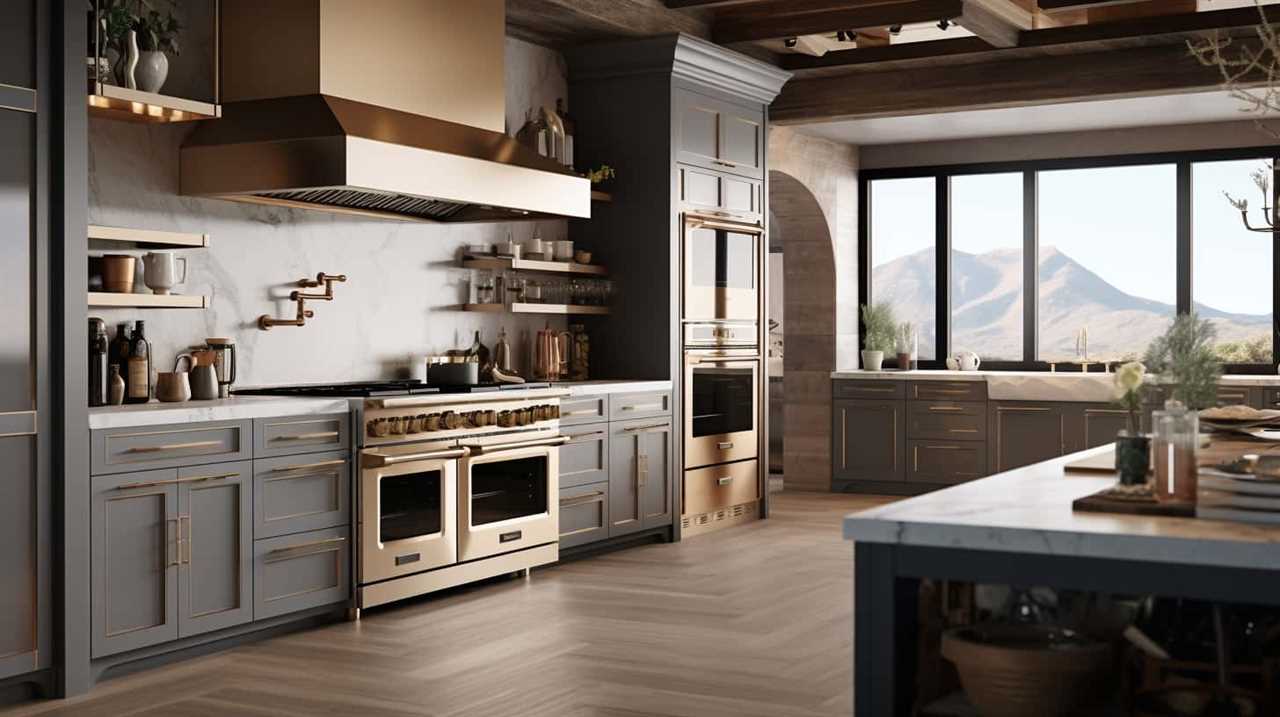
Why Is Adequate Ventilation and Airflow Important for the Safe Operation of Appliances?
Adequate ventilation and airflow are crucial for the safe operation of appliances. Without them, appliances can overheat, leading to potential fire hazards. Proper ventilation ensures that heat generated by appliances is effectively dissipated, preventing damage to internal components and potential malfunctioning.
Additionally, airflow helps to circulate fresh air and prevent the buildup of harmful gases or fumes that can be emitted by certain appliances. Regularly checking and maintaining ventilation systems is an important safety measure to ensure the reliable and safe operation of home appliances.
How Can Using Appliances in Unintended Ways Pose a Safety Risk?
Using appliances in unintended ways can pose a safety risk, such as overloading circuits or causing electrical shocks. It’s important to understand that mishandling appliances can lead to potential dangers, especially if they’re faulty or damaged.
To ensure safety, it’s crucial to read and follow the manufacturer’s instructions for proper appliance use. By doing so, we can minimize the risk of accidents and protect ourselves and our homes from any potential harm.
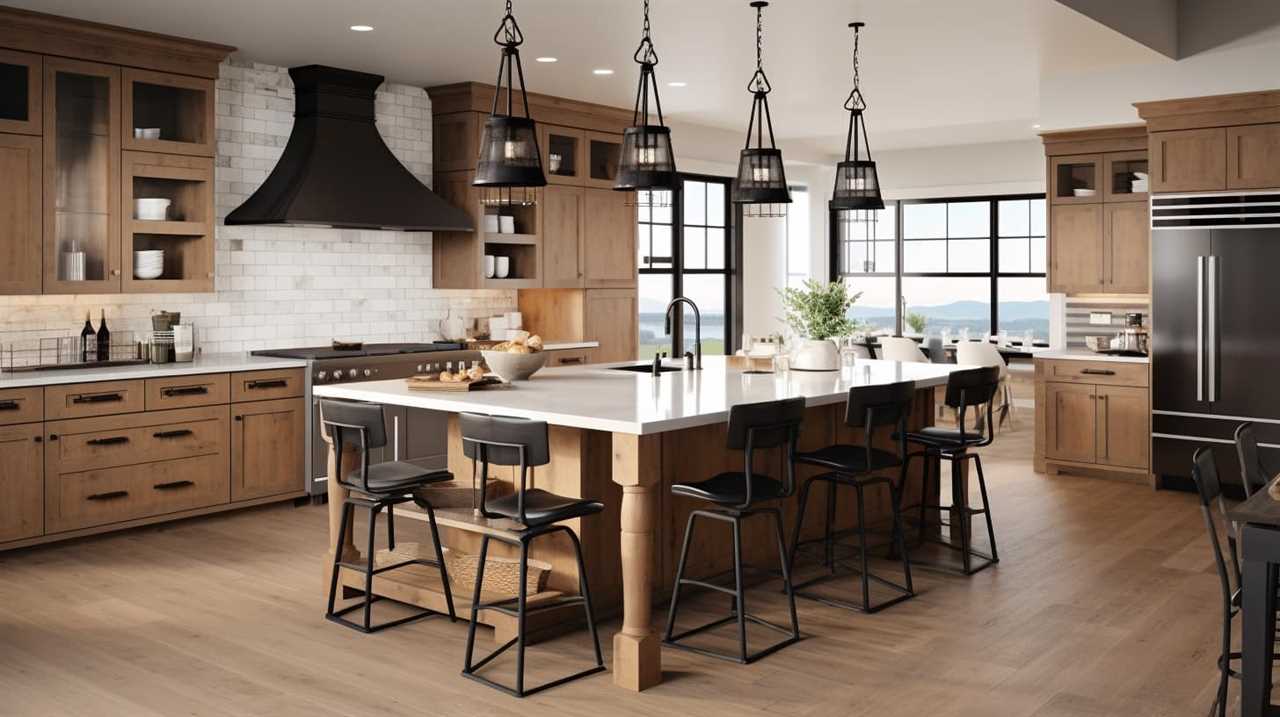
Conclusion
In conclusion, ensuring the safety of your home appliances requires regular maintenance, proper installation, and safe usage. By taking these measures, you can prevent accidents and extend the lifespan of your appliances.
Just like a well-tuned orchestra, where each instrument plays its part harmoniously, a home equipped with safe appliances operates smoothly, bringing peace of mind to its inhabitants.
So, let’s prioritize appliance safety and enjoy the sweet melody of a secure and efficient home.

